Background
Edward Lowe was born on March 24, 1950, in Dover, England, the United Kingdom, to Eric and Vera (Gibbon) Lowe.

Aldenham Rd, Bushey WD23 2TY, United Kingdom
Lowe attended Bushey Grammar School.
The Old Schools, Trinity Ln, Cambridge CB2 1TN, United Kingdom
Lowe went to Cambridge to study Natural Sciences in 1968, changing to History after one year and was awarded a Bachelor of Arts degree (first class) in 1971.
University of Oxford, Oxford OX1 2JD, United Kingdom
Lowe was awarded his Bachelor of Philosophy and Doctor of Philosophy degrees in 1974 and 1975 from the University of Oxford.
Edward Jonathan Lowe
Edward Jonathan Lowe
Edward Jonathan Lowe
Edward Jonathan Lowe








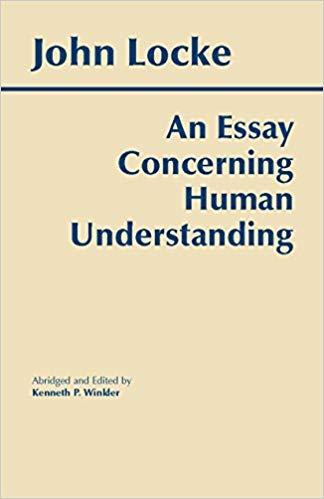
(Includes generous selections from the Essay, topically ar...)
Includes generous selections from the Essay, topically arranged passages from the replies to Stillingfleet, a chronology, a bibliography, a glossary, and an index based on the entries that Locke himself devised. Includes generous selections from the Essay, topically arranged passages from the replies to Stillingfleet, a chronology, a bibliography, a glossary, and an index based on the entries that Locke himself devised.
https://www.amazon.com/Essay-Concerning-Understanding-Hackett-Classics/dp/087220216X/?tag=2022091-20
1995
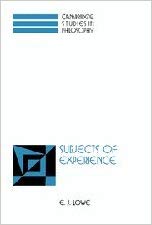
(In this innovative study E.J. Lowe demonstrates the inade...)
In this innovative study E.J. Lowe demonstrates the inadequacy of physicalism, even in its mildest, nonreductionist guises, as a basis for a scientifically and philosophically acceptable account of human beings as subjects of experience, thought and action.
https://www.amazon.com/Subjects-Experience-Cambridge-Studies-Philosophy/dp/0521475031/?tag=2022091-20
1996
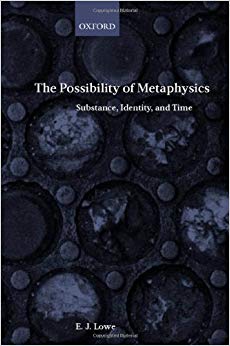
(Lowe argues in this fascinating new study that metaphysic...)
Lowe argues in this fascinating new study that metaphysics should be restored to centrality in philosophy, as the most fundamental form of inquiry, whose findings underpin those of all other disciplines. He portrays metaphysics as charting the possibilities of existence, by identifying the categories of being and the relations between them. He then sets out his own metaphysical system, with which he seeks to answer many of the most vexed questions in philosophy.
https://www.amazon.com/Possibility-Metaphysics-Substance-Identity-Time-ebook/dp/B001KVZLRU/?tag=2022091-20
1998
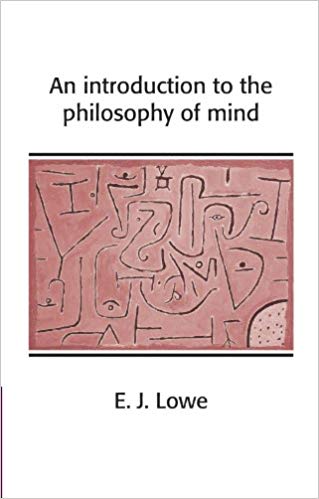
(E. J. Lowe offers a lucid and wide-ranging introduction t...)
E. J. Lowe offers a lucid and wide-ranging introduction to the philosophy of mind. Using a problem-centered approach designed to stimulate as well as instruct, he begins with a general examination of the mind-body problem and moves on to more specific issues including perception, rationality, action, and self-knowledge.
https://www.amazon.com/Introduction-Philosophy-Mind-Cambridge-Introductions/dp/0521654289/?tag=2022091-20
2000
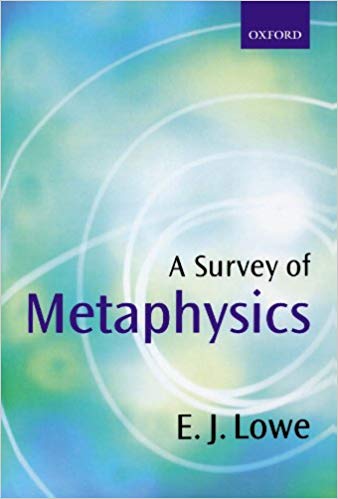
(A systematic overview of modern metaphysics, A Survey of ...)
A systematic overview of modern metaphysics, A Survey of Metaphysics covers all of the most important topics in the field. It adopts the fairly traditional conception of metaphysics as a subject that deals with the deepest questions that can be raised concerning the fundamental structure of reality as a whole.
https://www.amazon.com/Survey-Metaphysics-J-Lowe/dp/0198752539/?tag=2022091-20
2002
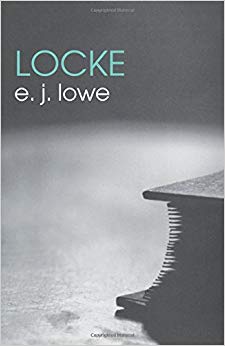
(John Locke (1632-1704) was one of the towering philosophe...)
John Locke (1632-1704) was one of the towering philosophers of the Enlightenment and arguably the greatest English philosopher. Many assumptions we now take for granted, about liberty, knowledge, and government, come from Locke and his most influential works, An Essay Concerning Human Understanding and Two Treatises of Government.
https://www.amazon.com/Locke-Routledge-Philosophers-J-Lowe/dp/0415283485/?tag=2022091-20
2005
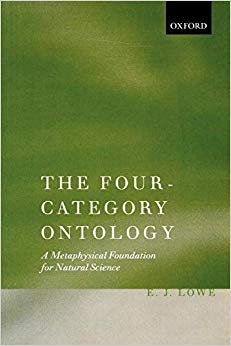
(E. J. Lowe sets out and defends his theory of what there ...)
E. J. Lowe sets out and defends his theory of what there is. His four-category ontology is a metaphysical system that recognizes two fundamental categorial distinctions which cut across each other to generate four fundamental ontological categories.
https://www.amazon.com/Four-Category-Ontology-Metaphysical-Foundation-Natural/dp/0199229813/?tag=2022091-20
2006
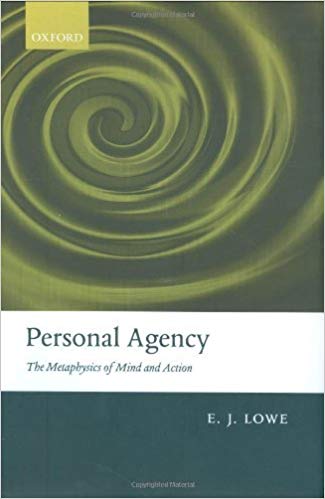
(Personal Agency consists of two parts. In Part II, a radi...)
Personal Agency consists of two parts. In Part II, a radically libertarian theory of action is defended which combines aspects of agent causalism and volitionism.
https://www.amazon.com/Personal-Agency-Metaphysics-Mind-Action-ebook/dp/B001LDKQFE/?tag=2022091-20
2007
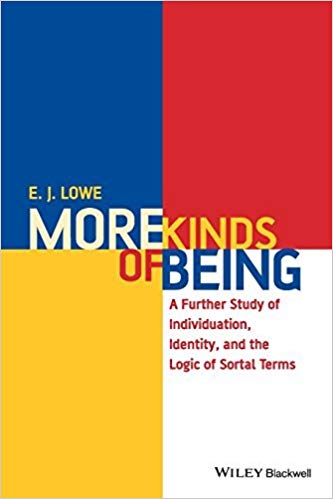
(Taking into account significant developments in the metap...)
Taking into account significant developments in the metaphysical thinking of E. J. Lowe over the past 20 years, More Kinds of Being: A Further Study of Individuation, Identity, and the Logic of Sortal Terms presents a thorough reworking and expansion of the 1989 edition of Kinds of Being.
https://www.amazon.com/More-Kinds-Being-Individuation-Identity-ebook/dp/B0053HRD9Q/?tag=2022091-20
2009
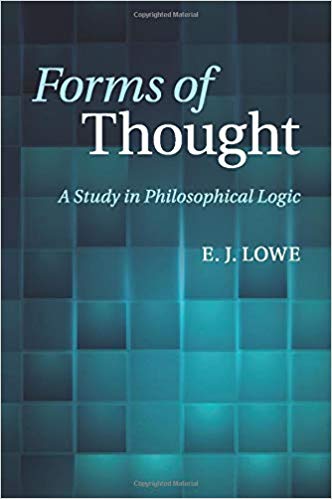
(Forms of thought are involved whenever we name, describe,...)
Forms of thought are involved whenever we name, describe, or identify things, and whenever we distinguish between what is, might be, or must be the case. It appears to be a distinctive feature of human thought that we can have modal thoughts, about what might be possible or necessary, and conditional thoughts, about what would or might be the case if something else were the case.
https://www.amazon.com/Forms-Thought-J-Lowe/dp/1107540437/?tag=2022091-20
2013
Edward Lowe was born on March 24, 1950, in Dover, England, the United Kingdom, to Eric and Vera (Gibbon) Lowe.
Lowe attended Bushey Grammar School. He went to Cambridge to study Natural Sciences in 1968, changing to History after one year and was awarded a Bachelor of Arts degree (first class) in 1971. Lowe switched to studying philosophy and moved to Oxford. He was awarded his Bachelor of Philosophy and Doctor of Philosophy degrees in 1974 and 1975 (supervised by Rom Harré and Simon Blackburn respectively).
Lowe is an author of treatises on metaphysics, philosophy of mind, and logic.
In his first book, Kinds of Being: A Study of Individuation, Identity, and the Logic of Sortal Terms, Lowe focuses on "sortal" concepts, or what it takes to individuate one object from another. Over several chapters Lowe challenges the notion that one object can belong to two separate classes, reasoning that the distinctions belong to the classification system and not to the object itself. In this sense, Lowe argues for the concept of "bare particulars," the set of attributes that define one, and only one, class of objects. He extends this relativity to the discussion of what it means to be an individual or person. In treating the issue of parts to whole, Lowe defines three different types of "wholes" - aggregates, collectives, and integrates - and arrives at the conclusion that some wholes are different from the sums of their parts. Michael Baur, reviewing Kinds of Being for the Review of Metaphysics, noted: "Lowe's purpose in this book is to examine the meaning and implications of sortal concepts, and to challenge relativist conceptions of identity and reductivist strategies in metaphysics." Baur called Lowe's work "carefully argued and well-written," and pointed out, "This study will be a challenge to anyone who wants to deny that ‘there are no "bare" particulars,’ as well as to anyone who has paid lip service to this claim without thinking through its far-reaching implications."
Lowe's next book, The Routledge Philosophy Guidebook to Locke on Human Understanding, looks at John Locke's seminal work, Essay concerning Human Understanding. (Locke is a primary influence on Lowe's work.) Locke, the seventeenth-century founder of British Empiricism, challenged the rationalistic notion that the mind is equipped with "innate ideas" - ideas that do not come from experience. In Locke's view, ideas come from two sources - perceptions and introspection on those perceptions. Perceptions lead to ideas, and ideas are the stuff of thought. Locke was led by this train of thought to a "causal," or representative, view of human knowledge. In Locke's universe, individuals are not directly aware of physical objects, but of the ideas those objects represent. This view raises the question of how much ideas resemble the objects that cause them. Locke felt that only some of an object's qualities are like the ideas that represent them and that only mathematical ideas are pure ideas. Lowe not only comments on Locke's Essay but also explicates how applicable the propositions in that essay still are.
In Subjects of Experience, Lowe explores the mind-body problem. Modern cognitive science seems to posit that the self and the body are one biological substance; most modern philosophers of the mind accept this as a basic tenet. Lowe hearkens back to the traditionalist view that psychological substance is different from physical substance. For dealing with the conundrum of the mental, non-physical, self-causing actions in the physical world, Lowe proposes a chain of causality. "The self ‘shapes’ the complex causal sequences that lead to action," wrote John Heil in a review of Subjects of Experience in the Times Literary Supplement. "My brain includes a vast network of intertwined causal chains, chains that extend backward in time and outward from my body." Heil welcomed Lowe's perspective: "Lowe is not reluctant to move away from the well-worn patterns of explanation in the philosophy of mind. In this regard, Subjects of Experience represents an infusion of ontological seriousness into a discussion that has been notoriously lacking in metaphysical bite. More than that, the book promises to liberate our thinking about minds and their place in the natural world from the functionalist ruts into which it has fallen in recent years." Katarzyna Paprzycka, writing for Philosophy in Review, had a similar take on Lowe's work: "The book's major strength is Lowe's brave attempt to take up a position about the mind (the self) which has fallen into disrepute." Paprzycka continued: "Lowe's many sharp criticisms and incessant attempts to defend scorned positions from too quick dismissals should be of interest to philosophers of mind on both sides of the divide."
Lowe followed Subjects of Experience with The Possibility of Metaphysics: Substance, Identity, and Time. In this work, he supplements his view of objects as they exist in space with a view of how they exist in time. A desk is not a desk, for instance, until its constituent pieces are assembled, and it ceases to be a desk if its legs are sawed off. In addition to exercising his views on what makes something a classifiable object, Lowe posits two ways to classify objects: by substantial universals and by non-substantial universals. Substantial here means classifying objects by "kind," such as "leaf" or "ball." Non-substantial means classifying by "property," such as "green" or "round." Lowe feels that these distinctions between kind and property are important because an individual leaf while exemplifying an instance of the universal "leaf," does not necessarily exemplify the universal quality of "green." Reviewing The Possibility of Metaphysics for the Times Literary Supplement, Frank Jackson wrote that "E.J. Lowe's good book is an essay in traditional metaphysics." Jackson continued: "He also offers us an interesting account of what metaphysics is - it is not a branch of semantics or of science, for example - and how it should be justified."
Lowe also wrote the book An Introduction to the Philosophy of Mind and has written articles for journals, including History and Philosophy of Psychology Newsletter, Consciousness in the Natural World Project, Aristotelian Society Supplementary Volume, and Mind. His many journal articles include "Why There Are No Easy Problems of Consciousness," in which he argues that no computational models can satisfy a definition of mind; "Self, Agency, and Mental Causation," in which he sums up and extends the arguments of his several books; "Why Is There Anything at All?"; and "Conditional Probability and Conditional Beliefs."
In his 2006 book, The Four-Category Ontology: A Metaphysical Foundation for Natural Science, Lowe provides a defense of his theory of his four-category ontology to explain reality. This metaphysical system recognizes two fundamental categorical distinctions between the particular and the universal and between the substantial and non-substantial. According to the author, these distinctions cut across each other to generate the four fundamental ontological categories known as substantial particulars (propertied individuals such as persisting concrete objects), non-substantial particulars (property-instances and relation-instances), substantial universals (natural kinds of persisting objects), and non-substantial universals (properties and relations conceived of as universals). The ontology discussed by the author has been traced back by some philosophers to Aristotle but has never been universally accepted and has fallen in and out of favor over the years. "In this excellent and thought-provoking book, Jonathan Lowe further develops and elaborates upon the ontological system that has been growing out of earlier works," wrote Brandon C. Look in the Review of Metaphysics. Here, the author argues that the four-category ontology provides a way to explain the nature of reality and life that far exceeds most, if not all, other systems. "This account of how universals and properties are to work in scientific explanation is the most interesting and likely most controversial part of the book," noted Look, who went on to write in the same review that "this is an excellent book which deserves to be read by everyone working in analytic metaphysics today."
He was a Professor of Philosophy at Durham University, England. He mainly researched and published in metaphysics, philosophy of mind, philosophical logic, and the history of early modern philosophy. He supervised many Ph.D. students, working on a wide variety of topics.
Lowe joined the Department of Philosophy at Durham in 1980, where he stayed for the rest of his career. He was promoted to Senior Lecturer in 1990, Reader in 1992 and then Professor in 1995.
Over the length of his career, Lowe published eleven single-authored books, four co-edited collections, and well over 300 papers and book reviews in journals and edited volumes. The range of topics covered in his published work is highly eclectic.
One of his contributions was a sophisticated defense of dualistic interactionism in the philosophy of mind. This, the view that the mind and the brain are distinct substances, and that facts about each are "causally relevant" to the other, is rare in contemporary philosophy.
(Includes generous selections from the Essay, topically ar...)
1995(Lowe argues in this fascinating new study that metaphysic...)
1998(Forms of thought are involved whenever we name, describe,...)
2013(John Locke (1632-1704) was one of the towering philosophe...)
2005(A systematic overview of modern metaphysics, A Survey of ...)
2002(Taking into account significant developments in the metap...)
2009(Personal Agency consists of two parts. In Part II, a radi...)
2007(In this innovative study E.J. Lowe demonstrates the inade...)
1996(E. J. Lowe offers a lucid and wide-ranging introduction t...)
2000(E. J. Lowe sets out and defends his theory of what there ...)
2006Lowe adopted a realist conception of metaphysics as an autonomous discipline concerned with the fundamental structure of reality, as exemplified by his important book The Possibility of Metaphysics (OUP, 1998). Metaphysics, he maintained, should take common sense as its starting point, while at the same time acknowledging that aspects of common sense will need to be revised or abandoned. It should also retain a healthy respect for science but resist scientism, as the role of metaphysics is to illuminate features of reality that empirical scientific inquiry inevitably presupposes. It is, therefore, the most fundamental form of inquiry and - as Lowe also emphasized - something that is extremely difficult to do. But, he insisted, there are no cheap shortcuts and no piecemeal solutions to metaphysical problems. Metaphysics is to be done systematically and patiently.
Lowe’s approach drew inspiration from Aristotle and Locke, amongst others, both of whom retained a foothold in common sense. His metaphysical writings addressed a range of themes, including volition, personhood, agency, mental causation, identity, truth, essentialism, vagueness, and ontological categories. One of his many notable achievements was the formulation of a new ‘four-category ontology’, which he proposed as a metaphysical foundation for all empirical scientific thought. Developed over several years, its most detailed statement appears in The Four-Category Ontology (OUP, 2006). All entities (actual and possible) are assigned to one of the following ontological categories: object (or individual substance); kind; attribute; mode (or individual accident).
Lowe argued that this achieves the best balance between parsimony and explanatory power, providing a unitary account of identity and individuation, causation, dispositions and tendencies, laws, possibility, necessity and truth-making. It also reflects intuitive classificatory practices and the structure of natural language. The relationship between ontology, language, and thought is further developed in his last book, Forms of Thought (CUP, 2013), which focuses on the notions of reference, predication, identity, modality, and conditionality. Amongst other things, the book works towards an account of the logical form of propositional thoughts that complements the four-category ontology.
Lowe has defended the position, once "a given" but now discounted by many philosophers, that the self and the body that houses the self are two different "substances." In explaining this position, Lowe has written that although he believes in the self he also believes that the self is not be identified as the body or the brain. This dualism, known in philosophical circles as the mind-body problem, shares center stage in Lowe's philosophical investigation with the question of whether the self can be a causative agent in a universe where only physical objects can cause change in other physical objects.
Quotations: "Absolute certainty is no more attainable in metaphysics than it is in any other field of rational inquiry and it is unfair to criticize metaphysics for failing to deliver what no other discipline - not even mathematics - is expected to deliver."
Throughout his life, Lowe was guided by a kind of faith in the ability to discover the fundamental structure of reality through metaphysical thought. He was spurred on by a constant sense of puzzlement, fascination, and bewilderment at the existence and nature of reality, and would not let extraneous considerations distract him from a resolute search for truth. Those who knew Jonathan will remember him not just as a gifted and committed philosopher but also as an exceptionally kind, caring and generous person. He was an accomplished teacher, who did everything he possibly could to encourage, nurture and inspire his students, many of whom have gone on to have successful academic careers. He was similarly supportive of his colleagues at Durham and of the wider philosophical community.
Lowe married Susan Robson on May 2, 1981, the had two children together, Rebecca and Timothy.
